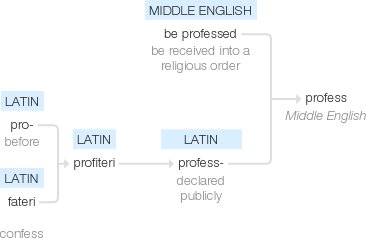Profess
Middle English (as be professed ‘be received into a religious order’): from Latin profess- ‘declared publicly’, from the verb profiteri, from pro- ‘before’ + fateri ‘confess’.
wiktionary
From Old French professer, and its source, the participle stem of Latin profitērī, from pro- + fatērī(“to confess, acknowledge”).
etymonline
profess (v.)
early 14c., professen, "to take a vow" (in a religious order), a back-formation from profession or else from Medieval Latin professare, from professus "avowed," literally "having declared publicly," past participle of Latin profiteri "declare openly, testify voluntarily, acknowledge, make public statement of," from pro- "forth" (from PIE root *per- (1) "forward") + fateri (past participle fassus) "acknowledge, confess" (akin to fari "to speak," from PIE root *bha- (2) "to speak, tell, say").
The meaning "declare openly" is recorded from 1520s, "a direct borrowing of the sense from Latin" [Barnhart]. Related: Professed; professing.
